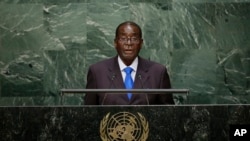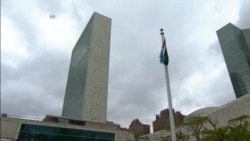While Zimbabwe President Robert Mugabe’s declaration that “we are not gays,” captured headlines around the world, not so highlighted, one analyst says, were his points on Africa’s quest to be seen as a global partner, need for reform of the United Nations Security Council, and justice and equality for countries like Palestine and western Sahara.
Speaking as both president of Zimbabwe, and also chair of the African Union, President Mugabe spoke broadly on various issues of concern to his country and continent, from self determination to end of the “illegal sanctions,” on his country.
In pushing for more recognition for Africa as an equal partner to the world, President Mugabe declared, "Africa is not looking for handouts."
Mr. Mugabe said, "rather, it is looking partners in massive infrastructural development, in creating and exploiting the value chains from its God-given natural resources, and in improving the quality of life of the continent's citizens."
On self-determination and independence, President Mugabe spotlighted the people of Sahrawi Palestine, as examples of places where these fundamental and intrinsic rights are not respected.
Mr. Mugabe said, “We are deeply concerned by the continued denial of this basic right of the Sahrawi people,” adding that the UN should expedite efforts to decolonize Western Sahara.
On the Middle East, President Mugabe declared they’ll be no lasting peace in the region outside the achievement of a two-state solution between Israel and Palestine. He challenged U.S. President Barack Obama’s position on the state of the Palestinian people, where he said the suffering continues unabated.
“What does Mr. Obama say about that?” Mr. Mugabe adlibbed, deviating from his script.
Mr. Mugabe said, “We [AU] reiterate our unwavering support to the just cause of the Palestinian people,” and again challenged Mr. Obama by asking off the cuff, “do we agree Mr. United States?”
Associate fellow of the Washington-based Institute for Policy Studies, Emira Woods, who said she was ‘stunned’ by the 91-year-old leader’s ability to convey such a speech before the 193-member UN General Assembly body, described Mr. Mugabe’s speech as being “right on point,” on substance.
“As a pan-Africanist, some of the language on western Sahara for example, as an internationalist, the language on Palestine, in support for Palestine, but clearly in terms of the substance of the speech, the thrust around global governance and changes that are so desperately needed for the UN Security Council to be much more democratic, much more open, particularly with Africa having greater representation in terms of having a permanent seat on the [UN] Security Council,” said Woods.
Woods applauded President Mugabe’s position on Palestine, which holds a non-member observer status at the world organization, saying “I think the U.S. has been duplicitous in terms of its role in undermining the call for justice, human rights and dignity in Palestine."
Mr. Mugabe’s speech came just days after Palestine raised its flag high at the UN Headquarters for the first time, along with flags of the 193 nation members, after winning the right to display it last month.
President Mugabe also brought up the issue of Libya as a source of the refugee crisis in the world, caused in part by what he called, “destabilizing policies of external forces.”
He accused the UN of going against the AU’s position on how to address the conflict in Libya, which resulted in the forceful removal of then leader Muammar Gaddaffi over allegations of human rights violations.
The Council’s resolution to approve the international military intervention in Libya has been among the many reasons Mr. Mugabe and many other African leaders have called for reform of the UN Security, pushing for Africa to have veto-power alongside the current 5-permanent members - U.S., Britain, France, Russia and China.
“I wish to reiterate our strong attachment to Africa’s common position on the reform of the Security Council, contained in the Ezulwini Concensus and the Sirte Declaration,” he said.
Mr. Mugabe elaborated, “in the case of Libya, we are witnessing the results of abusing the authority of the United Nation Security Council and ignoring the opinion of regional organizations, in this instance the African Union (AU), which are supposed to be the United Nations’ partners in the maintenance of international peace and security,” he said.
Woods said President Mugabe effectively articulated how the AU is often undermined by global forces.
“The African Union had a different approach in terms of Libya,” said Woods, “and I think Mugabe in the speech, skillfully asserted the position of the African Union and its relationship to the United Nations, but also had a case in point of an example of where the African Union path, the African Union’s decision was completely kind of sidelined, as other countries, the U.S. and Europe essentially went on and did what they did in Libya, the foreign intervention in Libya and the consequences thereafter have been so dire, not only for Libya and the region, but for the world.
President Obama who addressed the UN Assembly before Mr. Mugabe, had also touched on the issue of Libya, offering a position that some would describe as contrite, following the chaos that erupted after Gaddafi’s demise. President Obama said the U.S. will continue to act in the face of violations, but will be more “mindful” in its approach.
“Places where civil strife, border disputes, and sectarian wars bring about terrorist enclaves and humanitarian disasters, where order has completely broken down, we must act,” stressed Mr. Obama.
“But we will be stronger when we act together. In such efforts, the United States will always do its part we’ll do so mindful of the past, not just the lessons of Iraq, but also the example of Libya. When we joined an international coalition under a UN mandate to prevent a slaughter, even as we helped the Libyan people to bring an end to the reign of a tyrant, our coalition could have and should have done more to fill a vacuum left behind,” he offered.
Commenting on this, Woods said, “to hear the president of the United States say we are going to learn our lessons, it’s good to hear but I think we still need to see how that will play out in time.”
Closer to home, President Mugabe strongly denounced the “illegal sanctions,” on him, his wife and several members of his inner circle, over allegations of human rights abuses and stolen elections, calling for their immediate removal.
Mr. Mugabe challenged the European Union and the United States to explain “what wrong” his country had committed for the West to uphold the sanctions, which he said has destroyed his country’s economy.
To this, Woods said the U.S. should reconsider the targeted sanctions on Zimbabwe, given the dramatic change in relations between the U.S. and Cuba, with whom the U.S. has begun normalizing relations after a more than 40-year diplomatic row, as well as Iran, where the U.S. also recently lifted sanctions after the country agreed to suspend the production of high-level uranium.
Woods said Zimbabwe’s flaws pale in comparison. “I think if the U.S. has been able to advance in negotiations with Iran to the extent that they have, then I think it is long overdue to also examine the U.S. strategy with regards to sanctions in Zimbabwe.”
She said as in the case of Iran and Cuba, the U.S. has to examine the effectiveness of the sanctions, and adjust accordingly.
“I think what we have to do in the case of Zimbabwe from the perspective of U.S. foreign policy is to examine the extent to which the sanctions are still valid and the extent to which they are having an impact that’s desirable,” Woods said. “Clearly Zimbabwe’s economy is in a state where support for engagement may bring a better result in terms of the Zimbabwean people.
One area where Woods disagreed with the Zimbabwe leader, however, was the “we are not gay” statement that usurped what she said was an otherwise very impressive speech.
Woods said it was unfortunate that Mr. Mugabe picked the UN platform to spew such distaste for a group of people equality entitled to the protection of the laws guaranteed by the UN.
“The United Nations stands to protect human rights and human dignity and the rights of all on this planet, they are enshrined in the UN Declaration of Human Rights and so I think regardless of sexual orientation, those rights are and have to be protected,” she said.















